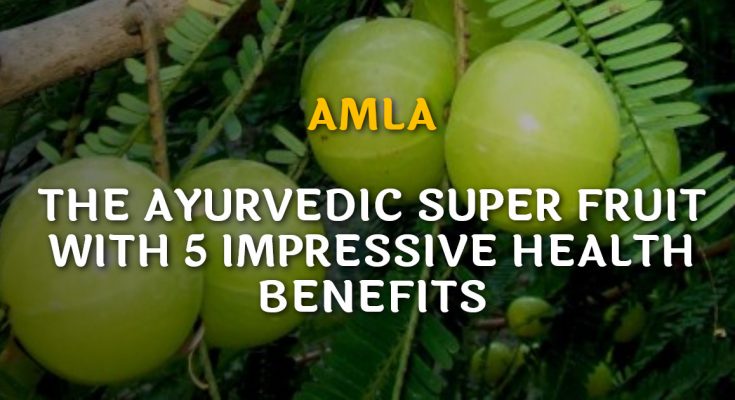Amla, also known as Indian gooseberry is a small fruit native to the Indian subcontinent and has been used for centuries in Ayurvedic medicine for its numerous health-promoting properties.
As an important plant in Ayurveda, amla (Phyllanthus emblica L.) has been traditionally used to support the immune system, treat stomach ulcers, diarrhea, dysentery, helminthic infections, diabetes and improve liver health.
In this article, we are going to explore the latest science on amla and its potential health benefits.
1. Amla – A Rich Natural Source Of Vitamin C

Amla is known to be one of the richest natural sources of Vitamin C.
The high concentration of Vitamin C in amla fruit helps to support and strengthen the immune system.
The scientific literature reports amla to have a Vitamin C content of approximately:
Values between 193 and 720 mg/100 g have been reported in different studies that evaluated a different variety of amla. – [1]
After Barbados cherry, amla is second richest natural source of vitamin C (ascorbic acid) having approximately 600 to 700 mg per fruit. – [2]
Natural sources of Vitamin C such as amla tend to be significantly more stable than synthetic ascorbic acid supplements.
This is due to the presence of other co-occurring antioxidants, such as tannins, which help to prevent vitamin C from oxidation.
One study documented the stability of Vitamin C in amla:
Vitamin C remains stable even after boiling the amla fruit in plain water for 80 minutes, indicating thereby that amla fruit and its dehydrated powder are highly stable natural sources of Vitamin C. – [3]
2. Amla – A Natural Hypolipidemic Agent

Amla has shown huge potential as a natural hypolipidemic agent for lowering lipids and cholesterol levels.
Dyslipidemia, a disorder characterized by abnormal lipid levels in the bloodstream, has earned its reputation as an important and modifiable risk factor in the development of cardiovascular disease.
Research has found amla supplementation to significantly reduce low-density lipoprotein cholesterol (LDL-c), total cholesterol (TC), and serum triglyceride (TG) concentrations, as well as an increase in high-density lipoprotein cholesterol (HDL-c).
The systematic review and meta-analysis of randomized controlled trials published 2023 concluded:
Amla supplementation shows promise for improving metabolic parameters in adults. – [4]
It is quite rare that a single agent effectively lowers both LDL/total cholesterol and triglyceride levels, whilst also increasing levels of the “good cholesterol” HDL-c.
This is even more impressive, when you factor in amla doesn’t have the side effects that are associated with statin medications, such as lowering Coenzyme Q10 and inducing mitochondrial dysfunction.
3. Packed With Antioxidants

Amla is packed with a variety of antioxidants including ascorbic acid, polyphenols such as gallic acid, tannins and other phenolic compounds.
The high antioxidant activity of amla is thought to contribute to many of its potential health benefits.
Several clinical trials have now found amla to be associated with improvements in the antioxidant status in humans.
These studies indicate that amla phytochemicals can exert antioxidant activity by limiting the formation of oxidation products, increasing antioxidant status, and also inducing the endogenous antioxidant defense system.
Particularly for clinical trials, the effect is promising to prevent oxidative induced by lifestyle (smoking) or the management of diseases (metabolic syndrome). – [1]
Amla has also been shown to significantly reduce the inflammatory biomarker C-reactive protein (CRP) concentrations in adults. – [4]
4. Anti-Diabetic Activity (Reduced Blood Glucose Levels)

Amla has garnered significant attention in recent years for its potential in managing diabetes.
Research has found amla berry to possess anti-diabetic activity such as reduced blood glucose levels.
Hydrolyzable tannins are the major bioactive components of amla and the most abundant hydrolyzable tannin is β-glucogallin.
The efficacy of an amla extract containing 10% β-glucogallin was compared against the medication metformin in newly diagnosed subjects with diabetic dyslipidemia in a recent study published in 2022.
The study found:
(Emblica officinalis extract) EOE-1 g, EOE-2 g, or metformin 500 mg for 90 days significantly decreased fasting blood sugar and postprandial blood sugar (FBS and PPBS), hemoglobin A1c (HbA1c) and lipid levels in all three treatment groups.
Supplementation with EOE-2 g day−1 showed greater efficacy than metformin in reducing circulating glucose levels.
Emblica officinalis extract – EOE-1 g and 2 g day−1 are safe and potent antidiabetic agents, with comparable efficacy to the pharmaceutical drug, metformin. – [7]
Another study published 2011 evaluated the anti-hyperglycemic and lipid-lowering properties of amla in normal and diabetic human volunteers.
The study found:
The results indicated a significant decrease (P < 0.05) in fasting and 2-h post-prandial blood glucose levels on the 21st day in both normal and diabetic subjects receiving 1, 2 or 3 g E. officinalis powder per day as compared with their baseline values. – [8]
5. The Super Fruit With Anti-Cancer Properties!

Amla has emerged as a potential natural chemo preventative and therapeutic agent in recent studies.
The high antioxidant capacity of amla once again appears to play a role in the anti-cancer benefits of this super fruit.
Some of amla’s myriad of anti-cancer mechanisms include:
Amla is also reported to possess radiomodulatory, chemomodulatory, chemopreventive effects, free radical scavenging, antioxidant, anti-inflammatory, antimutagenic and immunomodulatory activities, properties that are efficacious in the treatment and prevention of cancer. – [10]
The mechanism(s) implicated in gooseberry-mediated cancer inhibition are diverse and include antioxidants, Phase I and II enzyme modifications, anti-inflammatory action, regulation of the cell cycle, and modulation of oncogenic signaling genes. – [11]
Other research has found:
Importantly, In Vitro and In Vivo studies provide evidence suggesting P. emblica contains potential cancer preventing components that have demonstrated strong suppressive properties against tumor promoting mechanisms.
Studies in humans also indicate that P. emblica can offer various health benefits and synergize with other treatments. – [11]
References
[1] Functional and Nutraceutical Significance of Amla (Phyllanthus emblica L.): A Review
[3] Determination of Vitamin C Content of Phyllanthus Emblica and Chyavanprash.
[10] Amla (Emblica officinalis Gaertn), a wonder berry in the treatment and prevention of cancer
[11] Molecular Mechanisms of Cancer Prevention by Gooseberry (Phyllanthus emblica)
The information in this article has not been evaluated by the FDA and should not be used to diagnose, cure or treat any disease, implied or otherwise.
Always consult with a qualified healthcare professional before making any significant dietary or lifestyle changes including supplements and herbs.


